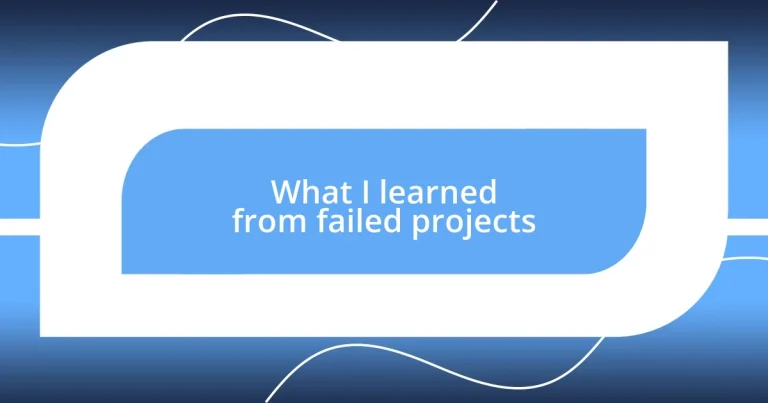Key takeaways:
- Failures in projects offer valuable insights; embracing them fosters resilience and leads to improved strategies.
- Common reasons for project failures include lack of clear objectives, poor communication, and inadequate resource management.
- Transforming setbacks into opportunities involves reflection, teamwork, and documentation of lessons learned to guide future projects.
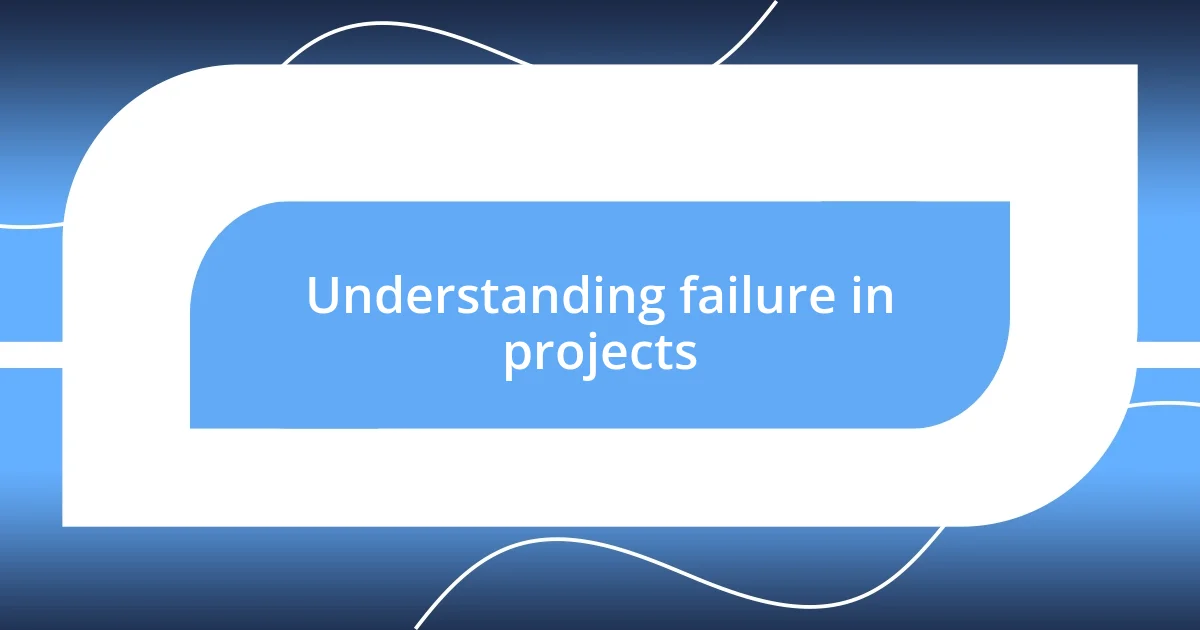
Understanding failure in projects
Understanding failure in projects is often seen as a setback, but I’ve come to view it differently. Each failed project taught me something valuable, igniting a deeper understanding of the obstacles we can face. For example, during a marketing campaign that didn’t gain traction, I realized how vital it is to align my strategy with my audience’s needs—not just my assumptions.
Have you ever poured your heart into a project only to watch it unravel? I have. There’s a certain vulnerability in experiencing failure that forces us to confront our methods and decisions. I remember a design project where I missed vital client feedback. The disappointment was palpable, yet it sparked a realization: communication isn’t just important; it’s the lifeline of any project.
When we truly analyze the reasons behind our failures, we often find unexpected insights. I learned that overlooking small details can lead to significant consequences. Through each misstep, I cultivated resilience, prompting me to ask, “What can I do differently next time?” It’s in these moments that I found the heart of project management—not just aiming for success, but learning to embrace and understand failure.
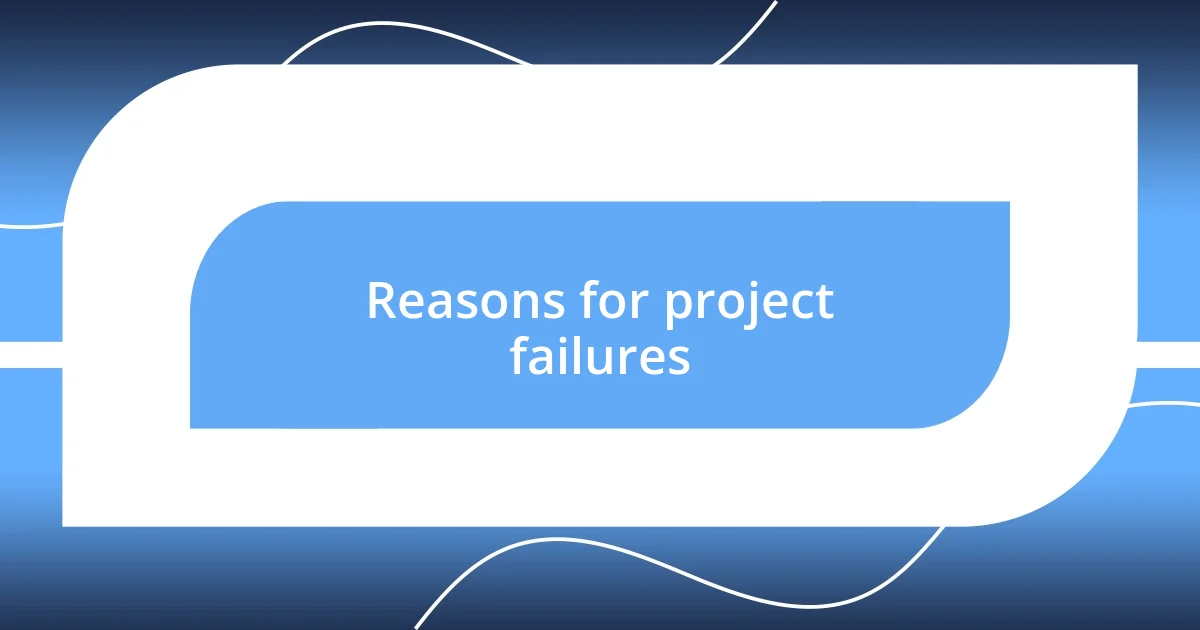
Reasons for project failures
One major reason for project failures often revolves around poor planning. I recall an initiative I spearheaded without enough groundwork, thinking we could figure it out as we went along. That approach quickly unraveled, revealing how crucial thorough preparation is. In hindsight, I recognize that dedicating time to establish a solid foundation could have spared us from frustration and costly delays.
Here’s a closer look at some common reasons behind project failures:
- Lack of clear objectives: Not defining what success looks like can leave the team paddling aimlessly.
- Insufficient stakeholder involvement: When key players aren’t engaged, vital perspectives and expertise are often overlooked.
- Inadequate risk management: Failing to identify and prepare for potential pitfalls can derail even the most promising projects.
- Poor communication: I once experienced a project where assumptions replaced dialogue, leading to misaligned goals and expectations.
- Resource constraints: Running out of time or budget is a frequent culprit that can sink projects that started with great promise.
Reflecting on these failures reminds me that every misstep can be a stepping stone towards greater understanding and success.
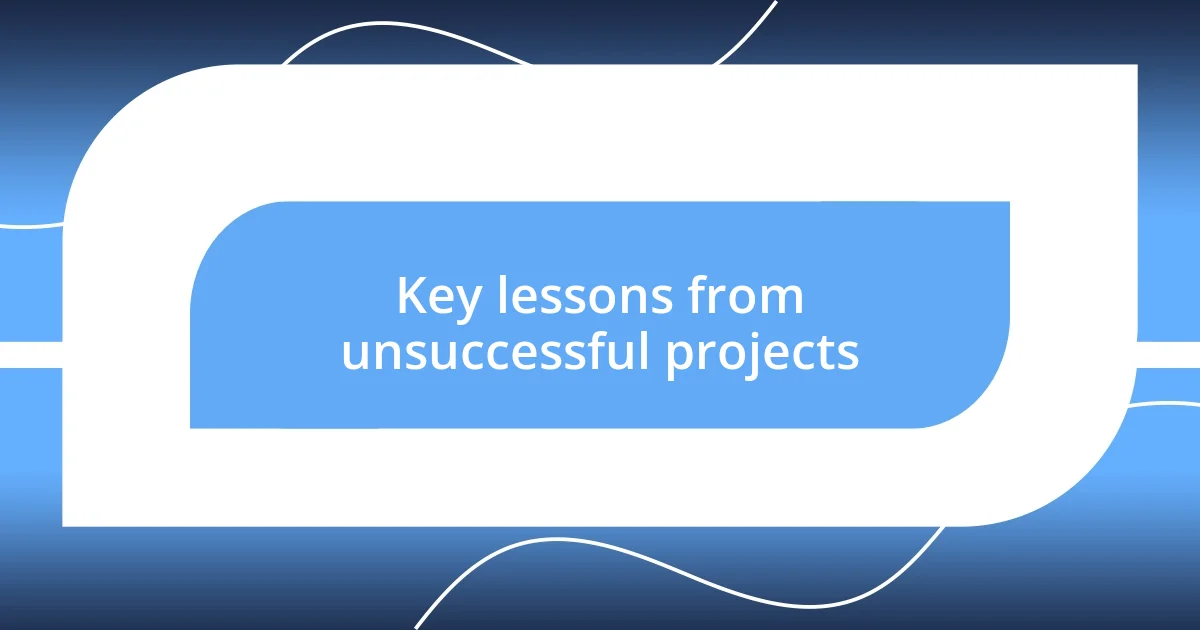
Key lessons from unsuccessful projects
Each unsuccessful project has its own story, but they share common threads of learning. One lesson that stands out for me is the importance of adaptability. I once led a tech project where we were so attached to our original plan that we ignored feedback about evolving user needs. It didn’t take long before we were left with a product that missed the mark entirely. This experience taught me to embrace a flexible mindset—being open to pivoting when necessary can lead to better outcomes.
Another key lesson revolves around resource management. Early in my career, I took on a project with overly optimistic time estimates. I vividly remember the mounting stress as deadlines loomed closer, realizing we simply didn’t have enough bandwidth to deliver quality work. It was a hard pill to swallow. I learned that realistic assessments of resources, both in terms of time and manpower, are crucial for project viability. A project is only as strong as the planning behind it.
Lastly, I’ve learned the significance of cultivating a culture of feedback. During one particularly challenging project, I neglected to create a safe environment for team members to voice their concerns. The inevitable result? A host of avoidable mistakes. Once I changed this dynamic, the team started to share their insights openly. This experience reaffirmed a vital truth: fostering honest communication enables growth and improvement, not just for the project but for everyone involved.
| Lesson | Personal Experience |
|---|---|
| Adaptability | Ignored user feedback in a tech project; learned to be open to changes. |
| Resource Management | Overly optimistic time estimates led to stress and unfinished work. |
| Feedback Culture | Lack of open communication resulted in mistakes; changed dynamics improved team insights. |
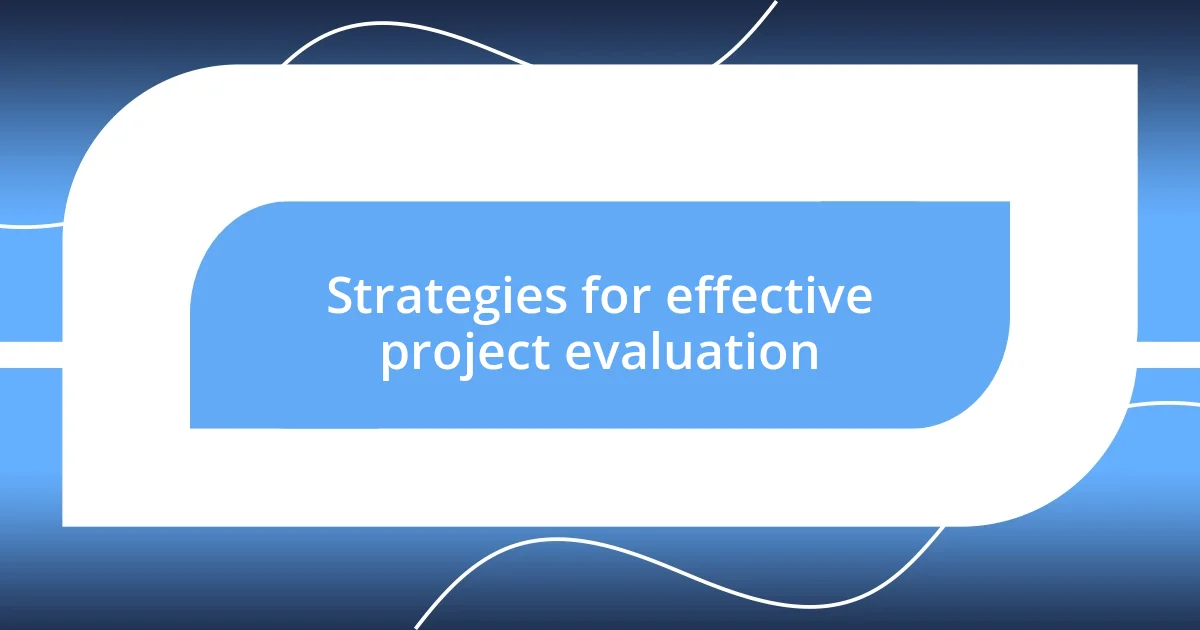
Strategies for effective project evaluation
When it comes to effective project evaluation, I’ve found that establishing a robust review process is essential. Integrating regular check-ins helps catch issues early, allowing for course corrections before they escalate. I once worked on a marketing campaign that had regular reviews, which revealed a misalignment with our audience’s expectations just in time for us to shift our tactics.
I also believe in the power of stakeholder feedback. In a project I managed, I made it a point to invite input from all team members after each milestone. This practice not only pinpointed areas needing improvement but also fostered a collaborative spirit. Have you ever seen how a team lights up when their voices are heard? It’s a game changer for morale and project success.
Moreover, using data-driven methodologies can significantly enhance the evaluation process. During a project focused on product development, we implemented metrics that tracked user engagement, enabling us to measure our achievements objectively. I must admit, seeing those numbers shift in our favor was incredibly satisfying and provided clarity on where we needed to focus next. Isn’t it amazing how numbers can tell a story we might overlook otherwise?
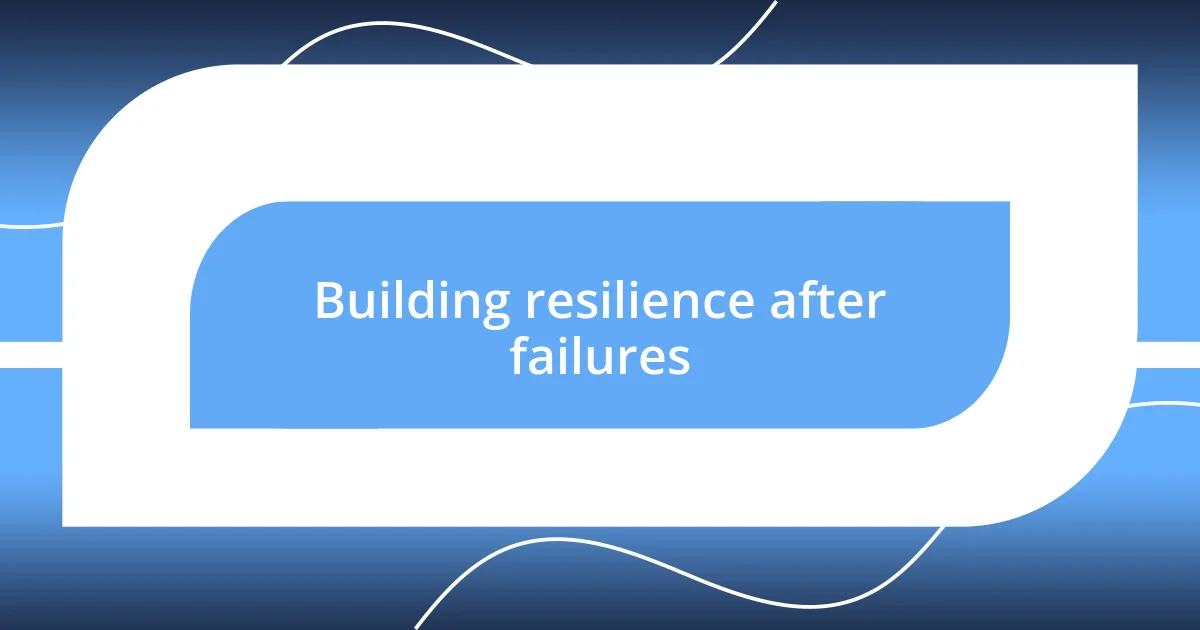
Building resilience after failures
Building resilience is an essential skill I’ve developed through my experiences with failure. I remember a time when my ambition led me to take on a challenging initiative without fully considering the potential hurdles. When things didn’t go as planned, I felt crushed. But that moment of vulnerability pushed me to reflect deeply on my approach. It reminded me that setbacks are just stepping stones to progress, propelling me to adopt a more resilient mindset.
In another instance, after a particularly disappointing project, I found it hard to shake off the feeling of defeat. I realized that embracing discomfort was part of building resilience. I started to remind myself of previous successes that followed failures, which helped shift my perspective. Could it be that every stumble brings us one step closer to our goals? I believe it does, and this realization encouraged me to transform that negativity into a drive for improvement and growth.
One of my most valuable lessons came when I learned to lean on my support network during rough patches. After a project fell through, I gathered with my colleagues to discuss what went wrong, transforming that failure into a shared learning experience. We laughed, we cried, and ultimately, we came out stronger. Isn’t it refreshing when we can navigate difficult times together? This camaraderie fostered a sense of resilience not just within me, but across the whole team. Each time we face setbacks together, it builds our collective strength and prepares us for future challenges.
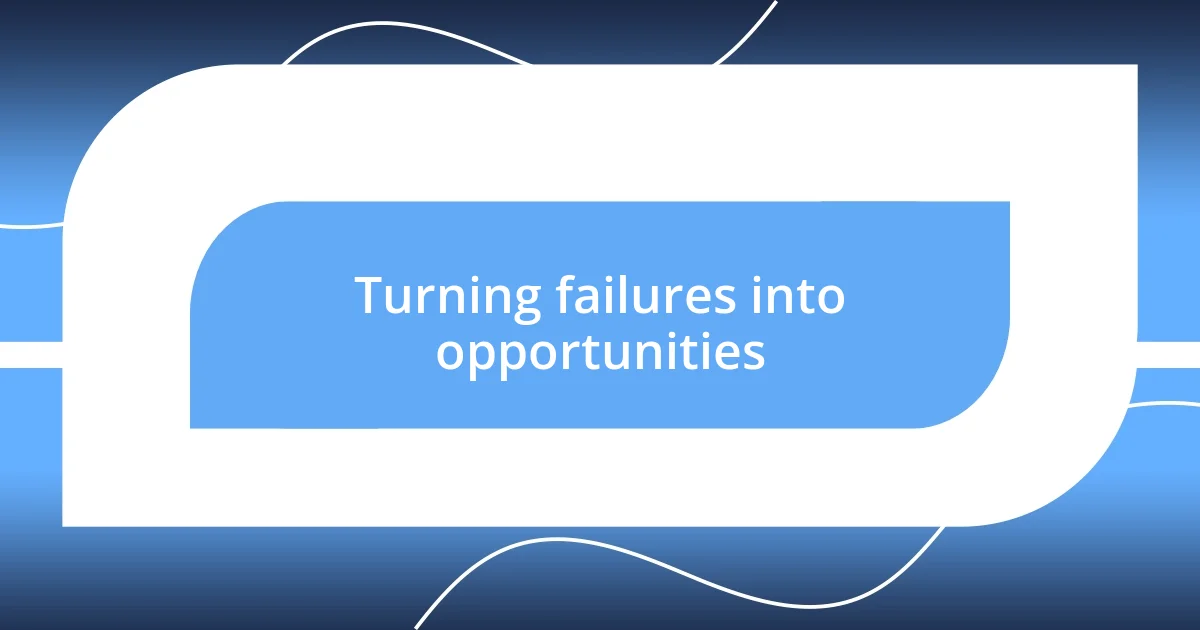
Turning failures into opportunities
When I reflect on times I’ve encountered failure, I often see them as the universe nudging me toward new paths. For example, after a project launch that fell short of expectations, I took a step back and began asking myself what constructive lessons I could extract from the experience. I was surprised to realize I uncovered not just insights about the project’s flaws, but also about my own decision-making style. Isn’t it fascinating how a setback can spark a deeper understanding of ourselves?
In another instance, I had a product that just didn’t resonate. Instead of wallowing in defeat, I turned to my team for a brainstorming session. Sharing the disappointment transformed the atmosphere; suddenly, we were all fueled by a collective creativity that I hadn’t seen before. We ended up pivoting the project into something entirely new, which ultimately became one of our biggest successes. Have you ever had the experience where frustration transformed into a creative breakthrough? That moment felt like pure magic.
Moreover, I’ve learned the significance of documenting these experiences. I keep a journal where I write down the failures, the feelings they stirred, and the lessons learned. This practice not only helps me track my growth over time but has also created a roadmap for future endeavors. Each entry serves as a reminder that even in failure, there’s a wealth of opportunity waiting to be uncovered. Doesn’t it feel empowering to realize that each misstep can become a stepping stone toward greater achievements?











